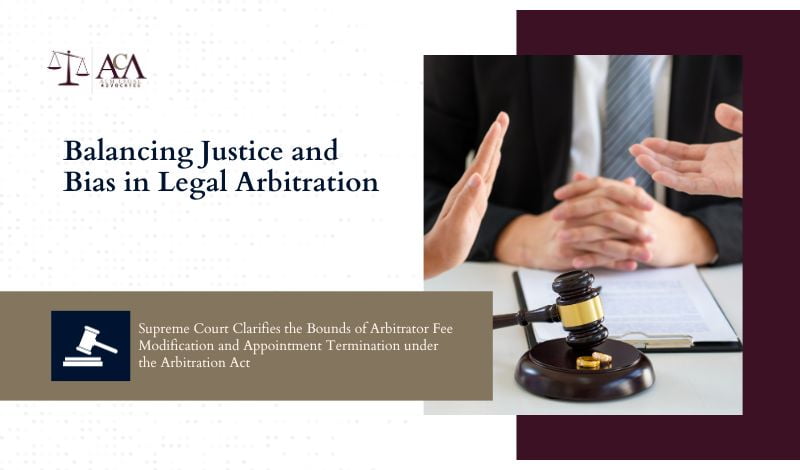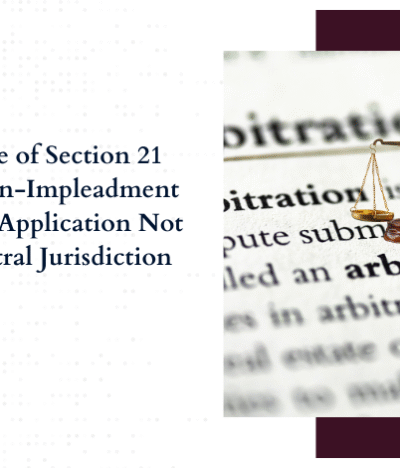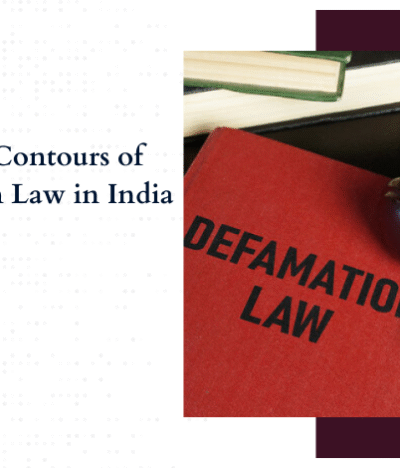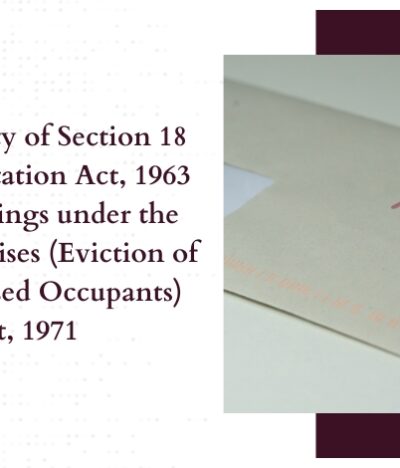In a significant precedent, the Supreme Court has ruled that the unilateral modification of fees by an arbitral tribunal, albeit impermissible, shall not lead to the termination of its appointment on the basis of disqualification under Section 12 of the Arbitration and Conciliation Act 1996.
Table of Contents
ToggleFOREWORD
The independence and impartiality of the arbitrator constitute an essential prerequisite for any arbitration process. The prohibition against bias represents a fundamental aspect of natural justice, applicable to all judicial and quasi-judicial undertakings. This principle originates from the imperative for an arbitrator, appointed according to the stipulations of the contract and by the involved parties, to remain detached from the parties. The responsibilities and obligations vested in the arbitrator necessitate transcending the partial interests of the disputing parties, refraining from engaging in actions that may advance the specific interests of either party.
Within the provisions of the Arbitration and Conciliation Act, 1996, there existed no explicit statutory provision to ensure the impartiality of an arbitrator designated for the resolution of disputes between involved parties. The revisions effected through the Arbitration and Conciliation (Amendment) Act, 2015, sought to incorporate safeguards intended to uphold equity in the administration of arbitration procedures, thereby mitigating instances of bias.
The enactment of the Amendment Act brought about notable modifications to the “grounds for challenge” of an arbitrator as follows:
- amendment of Section 12(1) of the Act, now mandates an arbitrator to disclose in writing the existence of any direct/indirect, past or present relationship with any of the parties to such dispute, which may raise justifiable doubts as to his impartiality. The newly introduced Fifth Schedule to the Act, provides guidance on what constitutes such “justifiable doubts”;
- introduction of Section 12(5) to the Act with the simultaneous introduction of Seventh Schedule, which specifies certain categories that render an arbitrator ineligible to act; and
- section 14 of the Act has been amended to include the provision of substitution of another arbitrator, upon termination of the mandate of an arbitrator.
BACKGROUND TO THE DISPUTE
An ongoing arbitration case was underway involving the Chennai Metro Rail Limited and Transtonnelstroy Afcons JV. The current dispute originated when the Arbitral Tribunal amended its fees, increasing them from Rs.1,00,000/- to Rs.2,00,000/- per session per Arbitrator. Although the respondent submitted the fee, the appellant raised objections. Dissatisfied with this development, the appellant contested the authority of the tribunal before the Madras High Court. The contention put forth was that there exists a reasonable fear of bias or partiality that may unfavorably impact the appellant. Consequently, the termination of the Tribunal’s authority is warranted due to its legal incapacity and failure to fulfill its mandated responsibilities. Nevertheless, the High Court dismissed the claim, leading to the appeal.
ANALYSIS AND FINDINGS
One of the significant advancements resulting from the Amendments is the incorporation of the Fifth Schedule and the Seventh Schedule into the Act, which has elucidated the differentiation between affiliations and situations that might raise legitimate concerns regarding the autonomy or neutrality of an arbitrator, yet may not inherently disqualify the arbitrator from participation.
In circumstances where the parties involved in an arbitration express concerns that the proposed arbitrator may be ineligible under Section 12(5) of the Act, combined with the provisions outlined in the Seventh Schedule of the Act, pursuing the appointment of an arbitrator under Section 11 of the Act represents a viable course of action. However, an issue arises, as highlighted in several judicial precedents, regarding the maintainability of an application under Section 11(6) of the Act seeking the appointment of an arbitrator, particularly when an arbitrator becomes legally or effectively unable to carry out their duties as stipulated in Section 14(2) of the Act.
The Hon’ble Supreme Court of India, in the case of TRF Ltd. v. Energo Engineering Projects Ltd [Civil Appeal No. 5306 of 2017], addressed this matter. Despite not explicitly referencing Section 14(2) of the Act, the court concluded that it possessed the authority, under Section 11(6) of the Act, to adjudicate on an arbitrator’s jurisdiction. Furthermore, it was affirmed that the court was entitled to examine the existence of the prerequisite condition for the exercise of its power, as well as the disqualification of the arbitrator.
In the case of National Highways Authority of India & Ors. vs. Gayatri Jhansi Roadways Limited & Ors. [2019 (9) SCR 1001] the Supreme Court conclusively addressed the matter pertaining to arbitrator’s fee when parties had contractually stipulated a fee schedule within the arbitration agreement. It determined that the Fourth Schedule of the Arbitration and Conciliation Act, 1996 does not constitute a mandatory provision for the determination of fees when an agreement between the parties has set the fee structure. The Court overturned the decision of the Delhi High Court.
In the case of HDR Corporation v. GAIL (India) Limited SLP (C) No. 20679 of 2017, is deemed as a pivotal reference for the resolution of forthcoming disputes concerning the selection of arbitrators.
Key highlights from this ruling include:
- Challenges concerning elements specified in the Fifth Schedule may solely be raised before the Arbitral Tribunal, subsequently presented before the Court only post the issuance of the Award.
- Challenges regarding elements outlined in the Seventh Schedule are not required to be initially raised before the Arbitral Tribunal and may be directly brought before the Court.
In the present case, the concept of de jure ineligibility because of existence of justifiable doubts about impartiality or independence of the tribunal on unenumerated grounds [ineligibility conditions in terms of Sections 12 (5)], therefore cannot be sustained. Bypassing the statutory procedure meticulously established by the Parliament may further sow seeds of uncertainty within the arbitration process. In essence, the de jure condition does not serve as the means to unilaterally instigate challenges midway through the arbitration proceedings and should not “open the gates” that prevent the court from addressing potential causes of arbitrator challenge beyond the specific parameters provided for within the Act.
CONCLUDING REMARKS
Section 14 of the Act stipulates that the authority of an arbitrator shall cease if they become legally or practically unable to carry out their duties. It additionally permits a party to seek court intervention in such instances of termination. Establishing a uniform standard was imperative to prevent frivolous litigation by parties, even in the most remote circumstances involving doubts regarding the independence or impartiality of arbitrators. To further enhance arbitration as an effective process, there must be trust in the arbitrators’ capacity to remain neutral and unbiased. In the case of Associate Builders v. DDA [SLP (CIVIL) NO.14767 OF 2012], the Supreme Court, while elucidating the framework of patent illegality as a basis for setting aside Arbitral Awards, held that “a violation of the Arbitration Act itself would be considered as a patent illegality” (Ssangyong Engg. & Construction Co. Ltd. v. National Highways Authority of India [(Civil Appeal No. 4779 of 2019)]).
Considering that allowing the appointment of an arbitrator despite their disqualification under the Seventh Schedule to the Act would contravene the provisions of the Act, rendering it patently illegal, it is submitted that there is no explicit prohibition against raising such a jurisdictional challenge for the first time in a Section 34 proceeding. Nonetheless, as a matter of best practice and caution, parties ought to endeavor to raise any and all jurisdictional challenges at the earliest, and in any case before the submission of the statement of defense, to avoid unnecessary wastage of time and resources.






